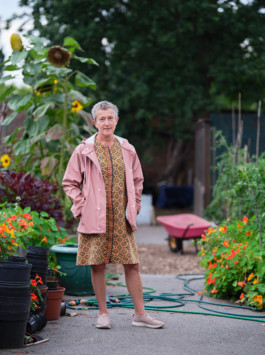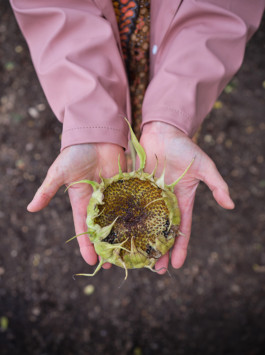Kate: “We need these communal outdoor spaces more and more”


listen:
Photography: Amit Lennon
Audio Producer: Melissa Viney
Music: The Iyatra Quartet
read:
I’m Kate Sebag, Director of Brockwell Park Community Greenhouses.
So here we’ve got these tremendously huge, enormous sunflowers, which have done literally all this growth since Covid. So, well – they’re just a symbol really of the time that’s gone by, and maybe a symbol of recovery as well. They just mean quite a lot to me, because I feel like I slightly adopted them at the beginning of Covid, and planted them and nurtured them with a school that I hadn’t previously worked with. And I just enjoyed working with them enormously. So with them, we planted these, along with loads of other stuff. We had a really sort of productive bed, but the sunflowers have persisted and are enormous, and just keep on changing. And they’re just so showy, aren’t they, and people admire them such a lot. They’ve got literally big heads. And they’re also really interesting in the way that they die as well, because they’ve set, most of the petals have come off now. So you’ve just got the seed heads left, which is sort of being stripped by the squirrels. So they’re really, really interesting looking.
People do definitely use the word haven, Eden, paradise… that there’s something – it’s partly, I think, I think it’s about being a green space within a green space. And it’s just very peaceful, isn’t it? And, and actually, we’re all sort of drawn together by this place, and a custodianship for the place. And also, if it doesn’t sound too sentimental, actually a sort of custodianship for each other as well. So, I think we all tend to be on our best behaviour here. We’re very kind with each other, and we meet people who we maybe normally wouldn’t meet with. And we’re just all brought together by our love of this space.
The greenhouse’s gardens are normally open to the public four days a week. At the moment, during Covid, they’re just open two days a week: at the weekend on Saturdays and Sundays. But actually, all through Covid we’ve had volunteers coming here to garden and look after the plants. And people have really benefited from coming here. I mean, they always benefit from coming here but I think, particularly during Covid, it just felt so special to be able to come to this safe, spacious outdoor space, which is just filled with so, so much beauty.
And actually it has been – we’ve been really blessed by the weather, haven’t we? And whilst saying ‘blessing’ during this really difficult time sounds a bit bonkers, at the same time, if Covid had struck us, I don’t know, in the middle of the darker winter months, I think that would have been – and will be, if it happens again – very, very difficult. At least we had it when the light was increasing all the time and the plants and wildlife are doing all their amazing things. But we are having our first little musical performance, if you like, with a band called iyatraQuartet, who are local to here, and who have performed quite a few times. They’ve been rehearsing here all through Covid because they love the acoustic of the greenhouse, and it was just a great space for them.
I think what Covid really brought into focus was just how differential the access to outdoor space is. And also, how much better people who were able to get to their own private gardens or a decent park – how much better they felt. I mean there’s just so much evidence for that in the general walk of life. But during Covid it was – maybe despite the fact that people have been publishing research, and people in all sorts of fields of caring, both in conventional medicine and in mental health have endlessly proved – better outcomes for patients who have access to green space. During Covid, it really did seem like everybody recognised that.
What was then problematic, of course, was that, in kind of really densely populated places like Lambeth, too many people - and too many people as were judged to be ‘too many people’ – wanted to use the park. And we’ve got short memories but it was really uncomfortable that, on the whole, it was people with private gardens who were being really critical of people using public space because they weren’t doing it – apparently – safely. Well, maybe it wasn’t safe. But the point is: we need these communal outdoor spaces, more and more and more, and that’s what a space like this offers to people. It’s a space which is for the community, and it should be as accessible as possible to as many people, whilst of course, keeping it safe.
I haven’t lost anyone during Covid, but I have lost a lot of people and I have just… I just know the pain, and it never goes away. And it gets less, but it’s… it can feel overwhelming.
And from my own personal experience, I mean: gardening definitely brings me closer to my mother, who died three years ago. And that means all my gardening brings me closer to her. Always has done, whether she was alive or not. And she… I suppose she just sort of feels like she lives on a bit. In fact, around the greenhouses, there are so many things from her and my father’s garden. And I know a lot of people who have been able to take, you know, cuttings or plants from their parents when they’ve passed away, and so it’s a lovely thing to do. You’ve lost the person, but you’ve still got their memory. And that’s, that’s, that’s part of the healing process.
Most people I think, would say that they gain a greater sense of wellbeing through being here. But we also do formally welcome people who have either self–prescribed or been prescribed by one of the local care providers. If people have been depressed, or are having a hard time, or have physical ill health we have bespoke gentle sessions on Friday afternoons. The pace of gardening helps you structure your life, because the plants don’t wait for you.
And volunteering here is sort of the same kind of thing: you have a structure, you know you’re going to come. Whilst we’re flexible about when you come, a lot of people do come at a regular time. So it’s part of the structure of their lives and if people are a bit lonely and a bit isolated – and I’m not talking Covid here I’m just talking generally – it’s really lovely to know that they’ve got this. This bit of friendly activity.
An Empathy Museum project made with the support of NHS England and NHS Improvement, The Health Foundation, and Arts Council England